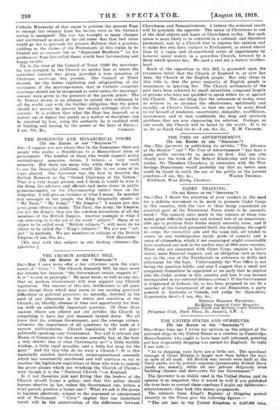THE CHURCH ASSEMBLY BILL.
[To THE EDITOR OP THE " SPECTATOR."]
Sta,—May I once more offer a few criticisms upon the argu- ments of " Civis " ? The Church Assembly Bill, he says, must not become law because " the Government cannot support it." It is " so new in principle." He must know, as well as any one, that no modern Government will ever support any Church legislation. The reasons of this are, indifference to all ques- tions except those which may cause or are causing practical difficulties or political pressure; or, secondly, disbelief in the need of any alteration in the status and condition of the Church; or, thirdly, absence of time and opportunity for deal- ing with an admittedly important question. Of these three reasons (there are others) not one justifies the Church in submitting to have her just demands turned down. We all know that the average Government, and the average citizen, estimates the importance of all questions by the scale of a narrow utilitarianism. Church legislation will not pay— politically speaking—any Government. Nor will it interest any House of Commons, for that secular assembly has, at the best, a very slender idea of what Christianity is--" a little worldly wisdom, a little tepid morality, and a little hot soup for the poor." And for this why do we want a Church ? It is this materially minded, hard-worked, undenominational assembly which has consistently smothered and will continue to try to smother the legitimate aspirations of those who wish to remedy the grave abuses which are wrecking the Church of Christ— even though it is the "National Church "—in England.
Is it not therefore just and fitting that the leaders of the Church should frame a policy, and that this policy should become effective by law unless the Government can, within a brief period, produce a better one ? What we ask is the power to legislate effectively, subject to the expressed or unexpressed will of Parliament. " Civis" implies that one immediate result will be the accentuation of the differences between Churchmen and Nonconformists. I believe the eventual result will be precisely the opposite. The union of Christians is one of the chief objects and hopes of Churchmen to-day. But such union is more likely to be achieved in a rational, and therefore permanent, way by a Church free to express her opinion and to make her own laws (subject to Parliament, as stated above) than by a vague and ill-considered series of experiments by however many zealots in a powerless Church, fettered by a State which ignores her. We need a real not a watery brother- hood.
Much of the opposition to this Bill is grounded upon the erroneous belief that the Church of England is, or ever has been, the Church of the English people. Her only claim to this title is, that the great majority of English people is unanimous in ignoring her. The Church settlements of the past have been achieved by small minorities, composed largely of persons who were not qualified to speak either for or against the Church. The one thing that the reformers of to-day want to achieve is, to increase the effectiveness, spiritually and socially, of Christ's Church, so that she may be more fitted to rid herself of weakness, uncertainty, disloyalty, worldliness, narrowness, and to face confidently the deep and intricate problems that are now clamouring for solution. Perhaps, as one result, the Church will be hated by the world. If it be so, let us thank God for it.—I am, Sir, &c., E. M. VENABLBS.


































 Previous page
Previous page